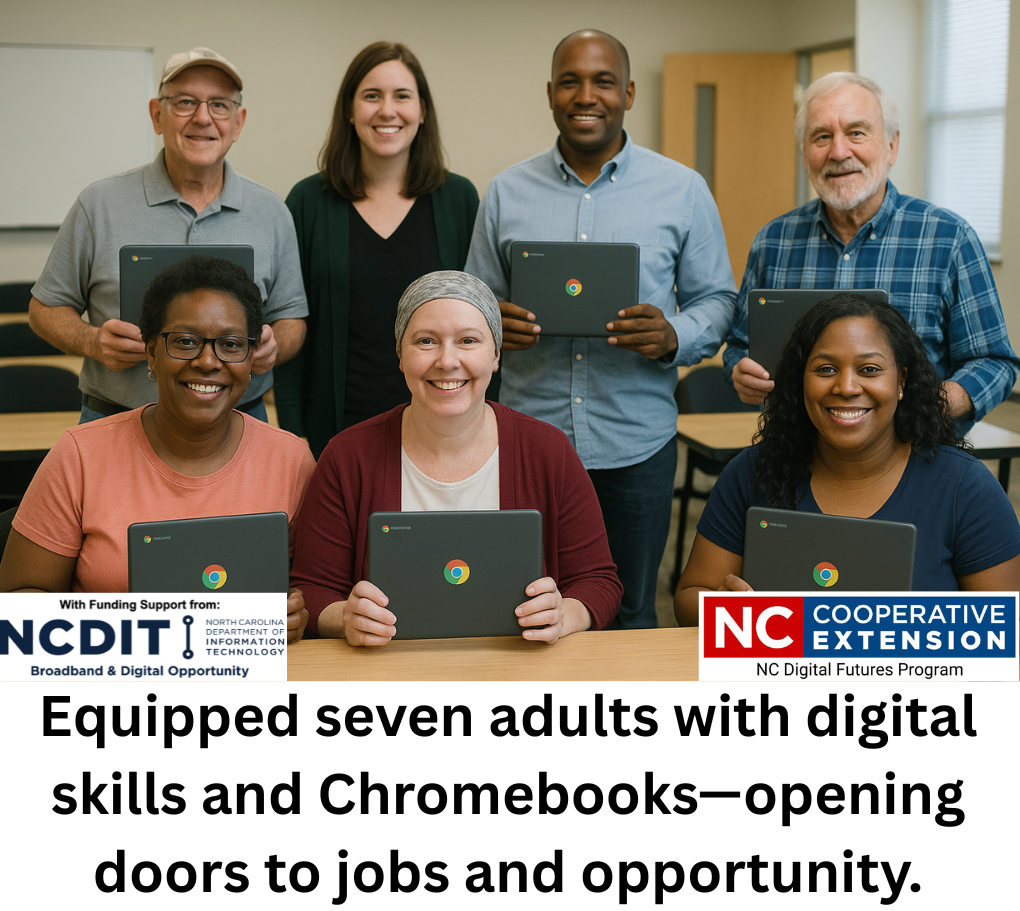Bridging the Digital Divide at Asheboro Housing Authority
go.ncsu.edu/readext?1084215
en Español / em Português
El inglés es el idioma de control de esta página. En la medida en que haya algún conflicto entre la traducción al inglés y la traducción, el inglés prevalece.
Al hacer clic en el enlace de traducción se activa un servicio de traducción gratuito para convertir la página al español. Al igual que con cualquier traducción por Internet, la conversión no es sensible al contexto y puede que no traduzca el texto en su significado original. NC State Extension no garantiza la exactitud del texto traducido. Por favor, tenga en cuenta que algunas aplicaciones y/o servicios pueden no funcionar como se espera cuando se traducen.
Português
Inglês é o idioma de controle desta página. Na medida que haja algum conflito entre o texto original em Inglês e a tradução, o Inglês prevalece.
Ao clicar no link de tradução, um serviço gratuito de tradução será ativado para converter a página para o Português. Como em qualquer tradução pela internet, a conversão não é sensivel ao contexto e pode não ocorrer a tradução para o significado orginal. O serviço de Extensão da Carolina do Norte (NC State Extension) não garante a exatidão do texto traduzido. Por favor, observe que algumas funções ou serviços podem não funcionar como esperado após a tradução.
English
English is the controlling language of this page. To the extent there is any conflict between the English text and the translation, English controls.
Clicking on the translation link activates a free translation service to convert the page to Spanish. As with any Internet translation, the conversion is not context-sensitive and may not translate the text to its original meaning. NC State Extension does not guarantee the accuracy of the translated text. Please note that some applications and/or services may not function as expected when translated.
Collapse ▲Access to technology and digital skills is no longer optional—it’s essential for education, employment, and navigating everyday life. But for many residents in low-income housing, these resources remain out of reach. At the Asheboro Housing Authority (AHA), residents voiced a clear need: they wanted to learn how to use computers and gain internet access at home to search for jobs, support their families, and connect with online services.
In response, Randolph County Cooperative Extension partnered with AHA to bring back a second round of the Computer Basics and Chromebooks course. This six-hour, hands-on class was part of the NC Digital Futures Program.
Led by Hannah Bradley, Digital Skills Educator in Randolph County, the class was designed to build digital skills from the ground up in a welcoming, no-pressure environment. Participants learned to:
-
Navigate a Chromebook
-
Set up and use email
-
Manage files and documents
-
Stay safe online
-
Use Google Docs
-
Search and apply for jobs
At the end of the course, each of the seven adult participants received their own Chromebook to keep—ensuring they could continue practicing their skills and accessing the internet from home.
Each participant had a powerful story. One student, a recent cancer survivor who had just earned her degree from a local community college, planned to use her new Chromebook to begin job hunting in her field. Another participant, a mother seeking remote work opportunities, shared that this was her first-ever home computer—a tool that could open the door to virtual employment and new stability for her family.
Results That Matter
This second round of the program did more than teach computer basics. It empowered seven Asheboro residents with the tools and confidence to shape their own digital futures. Whether they are supporting their children’s education, applying for jobs, or exploring remote work, these participants now have the digital foundation to take their next steps.
This story underscores the continued importance of local, accessible digital skills training—and the lasting impact it can have when rooted in the communities it serves.
To learn more about the NC Digital Futures Program, visit:





